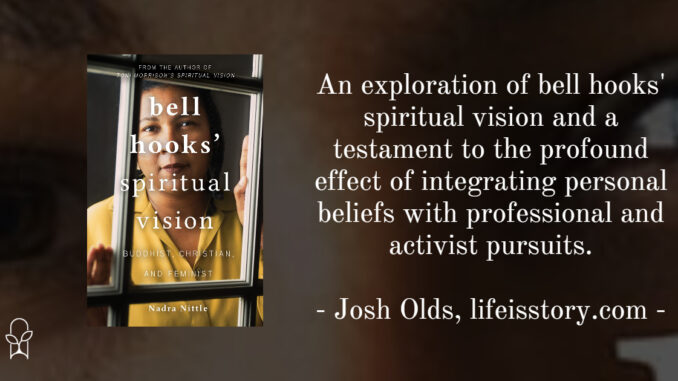
Published by Fortress Press on November 7, 2023
Genres: Non-Fiction, Biography
Buy on Amazon
Goodreads

When Black feminist and scholar bell hooks died in 2021, she was widely remembered for writing more than three dozen books across genres including memoir, poetry, theory, and criticism. However, it was her book Ain't I a Woman, in which hooks examines how Black American women have historically faced gender, class, and racial oppression, that catapulted her to prominence as a leading feminist thinker.
Nadra Nittle makes it clear that hooks identified not only as a feminist but also as a Buddhist Christian. In bell hooks' Spiritual Vision, Nittle recounts how hooks kept her spiritual practice private for years, fearing there was no room to discuss her faith in the feminist movement or in the academy. Ultimately, hooks decided to talk and write about her faith to give hope to students curious about her source of strength in a society she deemed an ""imperialist white supremacist capitalist patriarchy.""
Nittle traces the influences of the Rev. Martin Luther King Jr. and Buddhist monk Thich Nhat Hanh as hooks developed a spiritual practice centered on love as a force for social change. Although hooks opened up about her spiritual philosophy in the last decades of her life, Nittle argues that hooks's contributions to religious discourse are largely unheralded. bell hooks' Spiritual Vision reflects her identity as a feminist and a believer who knit together her political and spiritual practices.
This book offers readers a window into spirituality's role in hooks' writing on her life, love, feminism, and society. It speaks both to hooks's longtime followers and to newcomers to her writing. Regardless of their starting points, readers will get to know bell hooks for all she was--Buddhist, Christian, and feminist.
I must admit that before bell hooks died in December of 2021, the sum of my knowledge about her was that she eschewed the use of capital letters in her nom de plume and that she had written some poignant poetry. So when I saw bell hooks Spiritual Vision, written by Nadra Nittle and published by Fortress Press, I thought that a good way to learn more. The subtitle is three descriptors of hooks—Buddhist, Christian, and feminist—so the book also considers how hooks viewed the intersectionality and compatibility of these three things. In particular, the book delves into hooks’ synthesis of Christianity and Buddhism, revealing how her spiritual practices underpinned her views on love, liberation, and feminism.
bell hooks’ Spiritual Vision structures itself around the key themes in hooks’ life and works. The opening chapter sets the foundation for hooks’ spiritual life by talking about her Buddhist-Christian beliefs. The second chapter dives into her personal life and childhood. And the proceeding chapters return to how that upbringing eventually brought her to her foundational spirituality.
Nadra Nittle proves herself to be a competent spiritual biographer. While there’s so much information that could be given, she limits herself to the content that fits the book’s theme. bell hooks’ Spiritual Vision is insightful in its exploration of hooks’ spirituality, effectively linking it to her broader intellectual and activist endeavors. Nittle’s approach provides a fresh perspective on hooks’ well-known works, offering depth to our understanding of her motivations and beliefs as well as—for me, anyway—being an introduction to hooks’ work.
I do think that the work assumes readers know something of hooks’ life and work already, so I was forced to go back and read some biographical articles and Wikipedia—and occasionally do some Googling as I read—to fully understand the book. That’s not a bad thing, I just offer it as a warning that this is meant as a dive into a specific part of hooks’ life and not intended as a general biography.
Nittle succeeds in presenting a nuanced portrait of hooks as a person deeply influenced by her spiritual beliefs, which guided her activism and writing. The book is an essential read for those interested in understanding the spiritual dimensions of bell hooks’ work and how these underpinned her influential contributions to feminism, cultural criticism, and discussions on love and liberation. It serves not only as an exploration of hooks’ spiritual vision but also as a testament to the profound impact of integrating personal beliefs with professional and activist pursuits.
